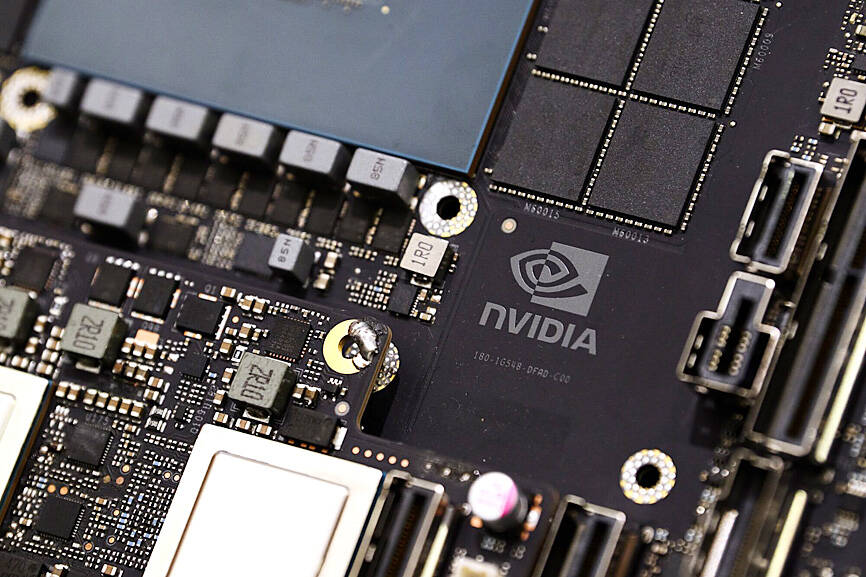Ibiden Co, the dominant supplier of chip package substrates used in Nvidia Corp’s cutting-edge semiconductors, might need to dial up the pace of production capacity increases to keep up with demand, company CEO Koji Kawashima said.
Sales of the 112-year-old company’s artificial intelligence (AI)-use substrates are robust, with customers buying up all that Ibiden has, Kawashima said.
That demand is likely to last at least through next year, he added.

Photo: Bloomberg
Ibiden is building a new substrate factory in Gifu Prefecture, Japan, which is expected to go online at 25 percent production capacity around the last quarter of next year before reaching 50 percent by March 2026.
However, that might not be enough, Kawashima said.
The company is in talks about when to get the remaining 50 percent capacity online, he said in an interview.
“Our customers have concerns,” he said. “We’re already being asked about our next investment and the next capacity expansion.”
Ibiden’s clients include Intel Corp, Advanced Micro Devices Inc, Samsung Electronics Co and Taiwan Semiconductor Manufacturing Co (台積電), as well as Nvidia. Many of them consult with the Japanese company early in product development, because the substrates — which help transmit signals from semiconductors to the circuit board — need to be tailored for each chip. Substrates must be made to withstand the heat of an Nvidia graphics processing unit to form an AI chip package complete with components such as memory.
Intel once comprised about 70 percent to 80 percent of Ibiden’s revenue from chip package substrates. That fell to about 30 percent in the fiscal year ended March, as the US chipmaker struggled to execute a turnaround that recently saw the ousting of its CEO Pat Gelsinger.
In October, Ibiden revised down its profit outlook after sluggish demand for components used in general purpose servers outweighed AI server-related growth. While noting it was important to expand business with chipmakers other than Intel, Kawashima said he was confident Intel would bounce back.
“Intel’s overall technology is very sophisticated,” he said. “Intel raised us up and opened so many doors. Our relationship with Intel will always be our treasure, and Intel will forever be an important customer.”
With many foreign chipmakers unwilling to transfer their latest technology to the US, Intel is likely to play a key role in Washington’s goal to boost cutting-edge semiconductor production capabilities at home, Kawashima said.
Ibiden has no manufacturing facilities in the US.
It has no plans to build any due to the cost of labor and logistics, irrespective of US president-elect Donald Trump’s plans to impose tariffs on a wide range of products, Kawashima said.
All of Nvidia’s AI semiconductors now use Ibiden’s substrates, although Taiwanese rivals such as Unimicron Technology Corp (欣興電子) are eyeing the field. However, it would not be easy to break Ibiden’s position as dominant supplier, Toyo Securities Co analyst Hideki Yasuda said.
“Nvidia’s AI chips need sophisticated substrates, and Ibiden is the only one that can mass produce them at a good production yield,” he said. “Taiwanese competitors won’t be able to take Ibiden’s share away by much.”
AI semiconductors earn more than 15 percent of Ibiden’s sales of about ¥370 billion (US$2.35 billion), with that percentage expected to rise further.
Nvidia said it has begun full production of its next-generation Blackwell chips after encountering some initial technical challenges.

UNCERTAINTY: Innolux activated a stringent supply chain management mechanism, as it did during the COVID-19 pandemic, to ensure optimal inventory levels for customers Flat-panel display makers AUO Corp (友達) and Innolux Corp (群創) yesterday said that about 12 to 20 percent of their display business is at risk of potential US tariffs and that they would relocate production or shipment destinations to mitigate the levies’ effects. US tariffs would have a direct impact of US$200 million on AUO’s revenue, company chairman Paul Peng (彭雙浪) told reporters on the sidelines of the Touch Taiwan trade show in Taipei yesterday. That would make up about 12 percent of the company’s overall revenue. To cope with the tariff uncertainty, AUO plans to allocate its production to manufacturing facilities in

Taiwan will prioritize the development of silicon photonics by taking advantage of its strength in the semiconductor industry to build another shield to protect the local economy, National Development Council (NDC) Minister Paul Liu (劉鏡清) said yesterday. Speaking at a meeting of the legislature’s Economics Committee, Liu said Taiwan already has the artificial intelligence (AI) industry as a shield, after the semiconductor industry, to safeguard the country, and is looking at new unique fields to build more economic shields. While Taiwan will further strengthen its existing shields, over the longer term, the country is determined to focus on such potential segments as

Chizuko Kimura has become the first female sushi chef in the world to win a Michelin star, fulfilling a promise she made to her dying husband to continue his legacy. The 54-year-old Japanese chef regained the Michelin star her late husband, Shunei Kimura, won three years ago for their Sushi Shunei restaurant in Paris. For Shunei Kimura, the star was a dream come true. However, the joy was short-lived. He died from cancer just three months later in June 2022. He was 65. The following year, the restaurant in the heart of Montmartre lost its star rating. Chizuko Kimura insisted that the new star is still down

While China’s leaders use their economic and political might to fight US President Donald Trump’s trade war “to the end,” its army of social media soldiers are embarking on a more humorous campaign online. Trump’s tariff blitz has seen Washington and Beijing impose eye-watering duties on imports from the other, fanning a standoff between the economic superpowers that has sparked global recession fears and sent markets into a tailspin. Trump says his policy is a response to years of being “ripped off” by other countries and aims to bring manufacturing to the US, forcing companies to employ US workers. However, China’s online warriors